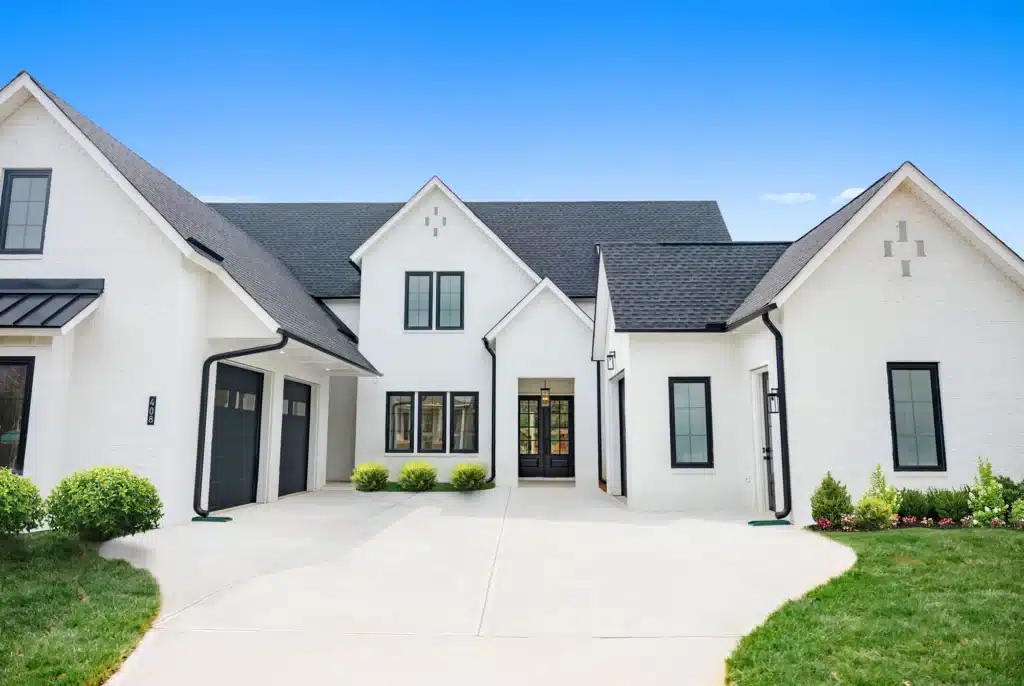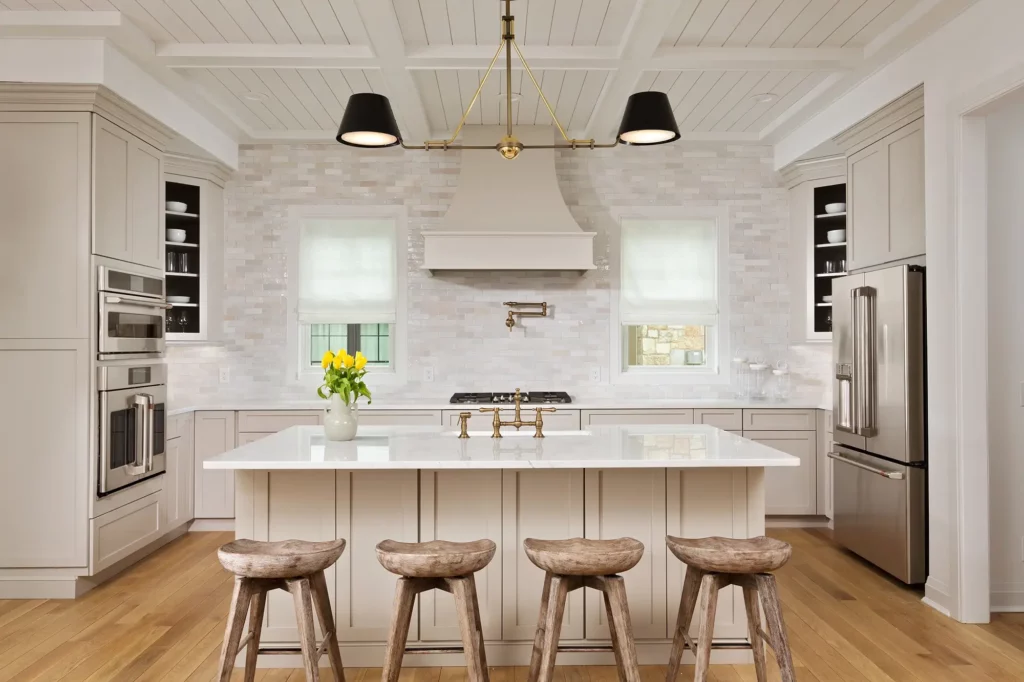
Welcome to the dynamic world of real estate, a landscape where the decision to invest in a new home or a used property can profoundly shape your homeownership journey. In this exploration, we navigate the nuanced world of home buying from our perspective at Beechwood Homes, East Coast’s premier home builder and developer of sophisticated lifestyle communities since 1985.
With a remarkable portfolio of over 10,000 homes across 80 communities in New York City, Long Island, Saratoga Springs, and North Carolina, we at Beechwood Homes have not only left an indelible mark on the map but also as a trusted guide in the homebuying process.
There are Substantial Advantages to Buying a New House
As Steven Dubb, principal at The Beechwood Organization, emphasizes, buying a home off floor plans presents substantial advantages, particularly in today’s economic climate.
Dubb highlights, “What it allows you to do is to lock in the price of your house,” shielding buyers from the unpredictable fluctuations in construction costs.
As Dubb explains, “When you buy pre-construction, you have the opportunity to make all those changes, to build it exactly the way that you want.” He adds, “It makes it a little bit easier to sleep at night.”
Current Market Trends
Recent trends indicate that new homes are capturing the biggest market share at 30% this year, given market conditions. The unique features and advantages offered by new constructions are a key contributor to this trend.
While the decision is shaped by the unique needs of each homebuyer, these compelling benefits are hard to ignore.
Amid the logistical and financial considerations, there is an often overlooked factor that should not go unaccounted for – the sentimental considerations of starting fresh.
The allure of a brand-new home carries a unique satisfaction, akin to unwrapping a pristine gift. Stepping into a home untouched by previous inhabitants, with the smell of fresh paint and the promise of untouched spaces, can evoke a sense of ownership and a fresh start.

This emotional connection to a new home goes beyond the tangible features; it’s about embracing a property where every nook and cranny is uniquely yours from the very beginning.
Balancing these aspects with practical considerations will help keep course with the lifestyle you envision for yourself.
The Pros of Buying a New Home
- Less Buyer Competition – Buyers of new construction homes typically face less competition, especially in markets with low inventory. Unlike resale properties, where multiple offers may be common, new construction buyers often find themselves in the driver’s seat, with a higher degree of control over the purchase process.
- More Resale Value – While the home you buy will no longer be new when you sell it, a five-year-old home is often more desirable than a significantly older property at resale. New communities may also have an unwritten home-value escalation clause, potentially benefiting homeowners concerned about long-term resale value.
- Modern Floor Plans and Customization – Our new homes are designed to meet contemporary preferences with open floor plans, flexible home offices, large windows, and ample storage. Enjoy opportunities for personalization, allowing you to choose finishes, fixtures, and optional features.
- Flexibility for Space and Wiring Customization – One of the most appealing aspects for new construction buyers is the opportunity to have everything brand new and tailored to their preferences. Additionally, new homes come equipped with the advanced wiring needed for high-speed electronics, communication systems, and security features.
- Energy Consumption & “Green” Construction – If energy efficiency and environmental concerns matter to you, newly constructed homes often outshine their resale counterparts. Built to meet or exceed stringent utility standards, these homes offer significant long-term energy savings and improved indoor air quality.
- Lower Maintenance Costs – Experience reduced maintenance costs with brand-new systems, appliances, roof, and foundation. Most of these components come with builder warranties, providing an extra layer of protection.
- Warranties and Smart Home Features – Builders typically offer warranties on materials and workmanship, and new homes often incorporate smart features, enhancing convenience and energy efficiency.
- Potential Long-Term Savings – Benefit from energy-efficient construction leading to lower utility bills over the long term.
The Cons of Buying Used Housing
- Outdated Floor Plans – Older homes may have outdated floor plans that might not align with contemporary living preferences.
- Potential Budget for Repairs and Upgrades – The age and condition of the home will necessitate budgeting for significant repairs or upgrades.
- Less Energy Efficiency – Existing homes may have less energy-efficient appliances and systems, leading to higher utility bills.
- Limited Personalization Options – Remodeling to change the structure of an existing home can be complicated and expensive compared to the relative ease of personalization in a new home.
- Outdated Building Codes – Used houses are often far from being up to code, especially when it comes to electrical wiring and Ground-Fault Circuit Interrupter (GFCI) outlets. This could potentially lead to safety hazards, and bring about the necessity for costly upgrades and code compliance works.
- Risk of Lead-Based Paint – For homes constructed prior to 1978, there is always the potential risk of lead-based paint, which if ingested or inhaled, can lead to serious health issues, particularly in children.
- Potential Presence of Asbestos – Although not currently banned in the United States, the Environmental Protection Agency (EPA) did prohibit the use of asbestos in some new products post-1989. Therefore, used homes built before 1980 might be more likely to contain asbestos, exposure to which can lead to severe health problems over time.
A Comprehensive Home-Buying Checklist
Navigating the journey of acquiring a home demands attention to detail and careful consideration.
To facilitate a more seamless homebuying experience, there are strategies to consider as you embark on your quest for the perfect home.
The following steps cover all aspects of buying a property, from inspecting foundational issues and evaluating cost to considerations around your moving in schedule.
- Identify issues such as water damage, foundation, mold, roofing, electrical, and plumbing.
- Evaluate total costs, including the purchase price, potential repairs, property taxes, HOA fees, and insurance.
- Explore safety, amenities, and school quality; talk to neighbors to understand the community.
- Research recent sales and historical property values to gauge the potential resale value.
- Verify if the seller or previous owners obtained necessary building permits and used licensed contractors for any home renovations or additions. Illegally completed work could lead to future legal and safety issues.
- Scrutinize seller disclosures for known issues and past renovations, whether for a new or resale property.
- Evaluate the energy efficiency of appliances and systems, considering potential upgrades.
- Complete a radon test and a careful check for any signs of current or past termite or rodent infestation. This safeguards residents’ health and safety while preventing potential future expenditures.
- Check zoning rules for potential modifications or personalization options in both new and resale homes.
- Assess the age and condition of major components, considering potential maintenance costs.
- Use inspection results for fair pricing based on market trends, applicable to both new and resale properties.
- Ensure all legal paperwork, including the title, is in order for a smooth transaction, regardless of property type.
- Secure pre-approval and anticipate potential delays in the loan approval process.
- Plan for a smooth transition and possession of the property, accounting for any construction or closing timelines for new homes that would affect your moving in schedule.
*This home-buying checklist is a general guide and does not replace professional advice. Consult with qualified experts for personalized guidance, and recognize that local variations and unforeseen circumstances may impact your specific home-buying experience.
Explore Our Portfolio
The journey to homeownership is a personal and nuanced one, influenced by individual preferences and the ever-evolving economic landscape. Beechwood Homes is here to guide you.
Our team understands that your dream home is as unique as you are.
For a more personalized exploration of your options and to discover homes that align with your vision, we invite you to explore our current offerings or contact our experienced team.
Your dream home awaits, and we look forward to being a part of this exciting chapter in your life.